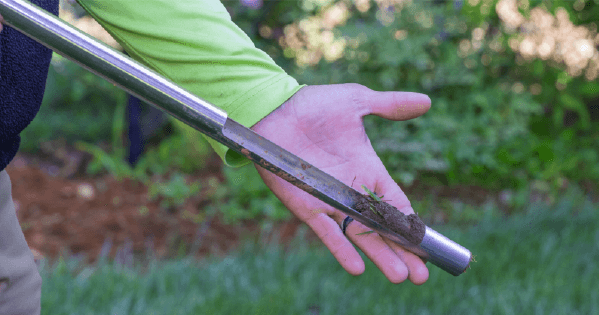Armyworm ALERT 2021
Armyworms, also referred to as fall armyworms, are currently out in force in Metro Atlanta lawns. Most years we see very little armyworm activity in metro Atlanta and when we do, it’s in the fall months of September to October. Yet here we are in August and we are seeing widespread armyworm damage with high populations. The name, armyworm, comes from their habit of “marching” in large numbers across lawns as they feed on the blades of turf grass freely and conspicuously, even during the day. Armyworms damage lawns by chewing blades of grass, resulting in a very distinctive line between damaged and undamaged turf. 
Biology
The armyworm is the caterpillar of a moth that migrates north from Florida each spring and summer. In late-summer, female moths lay several hundred eggs that will hatch after just a few days. Once the eggs hatch, the larvae (caterpillars) will drop to the ground in search of food. Armyworms feed on a variety of plants, but prefer grasses, bermudagrass being the most common. These caterpillars are most active on lawns during the early morning or late afternoon/evening but have been known to feed at any time of day, especially on tall, unmaintained turf; on well-maintained turf, armyworms will spend the heat of the day deep down in the turf. The caterpillars will continuously feed for 2-3 weeks before returning to the soil to pupate. Roughly 10-14 days later, new adult moths will emerge and start the lifecycle once again. During the summer, it is possible to have four or more generations per year.
Damage
The severity of armyworm damage in lawns can vary based on grass type and maintenance practices. Young caterpillars skeletonize grass blades whereas mature caterpillars will feed on the entire blade of grass. Damaged turf has a ragged appearance with signs of chewing damage. As the armyworms feed, they leave behind brown patches that can resemble drought or heat stress. With high populations, grass may be devoured down to the ground and large numbers of birds may be seen feeding in your lawn. You can check your lawn for armyworms by mixing one ounce of dish soap in one gallon of water and pouring this mixture over a small area in your lawn where an infestation is suspected. The detergent irritates the armyworms, causing them to emerge quickly.
Management
If you have active army worms the best treatment is a contact liquid insecticide labeled for armyworms. Once a contact insecticide is applied to the entire lawn, you will see immediate results for any active caterpillar-stage armyworms. A follow up treatment may be required in 14 days due to a 2nd or 3rd generation of armyworms.
We do have an option for 2022 to help prevent armyworms along with grubs and other harmful lawn insects. It must be applied in the spring as a preventative systemic insecticide and lasts the entire growing season. A treatment applied in April or May each year will provide season-long control of armyworms, eliminating them before any damage takes place. If you find you have an infestation of armyworms immediate action should be taken. A contact insecticide should be applied to the entire lawn and you should conduct a soap water test in 10-14 days to determine if a 2nd generation has emerged.
For more information about our Metro Atlanta lawncare services, give us a call at 770-923-0387 or contact us online!
About Simply Green Lawn Care

Simply Green aims to provide the highest quality lawn care, mosquito control, and lawn pest control services to Georgia residents.
We are locally owned and operated which allows us to be accessible, attentive, and responsive for customers in Georgia.
Our well-trained team is easy to work with and determined to exceed expectations.
All our plant health care specialists are Georgia Department of Agriculture Certified and maintain their Category 24 applicators license.

